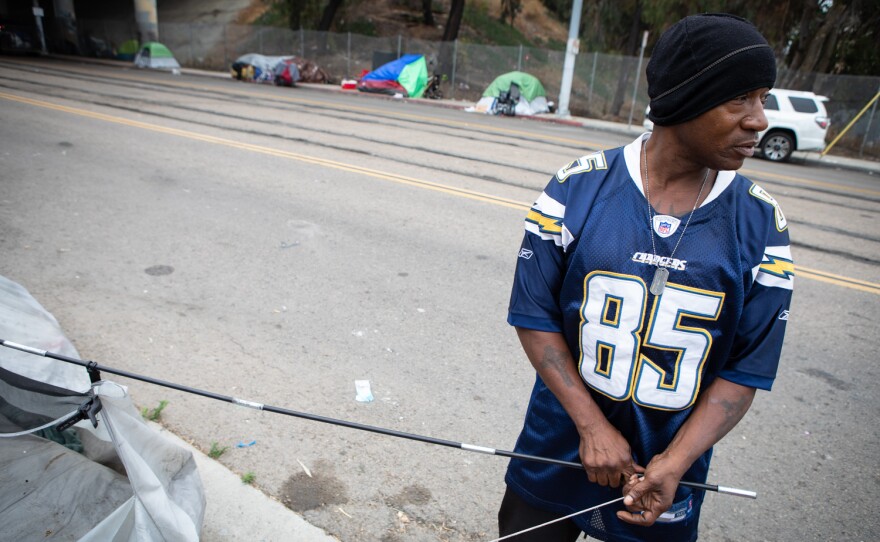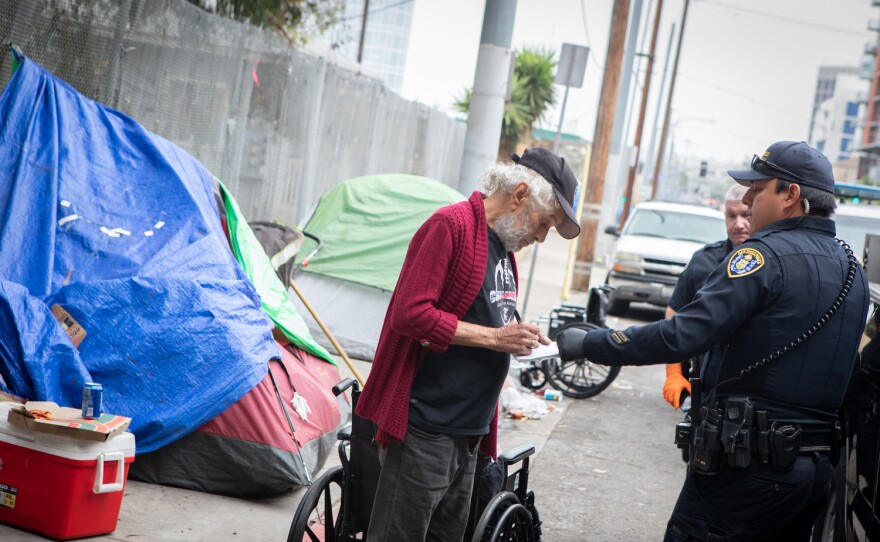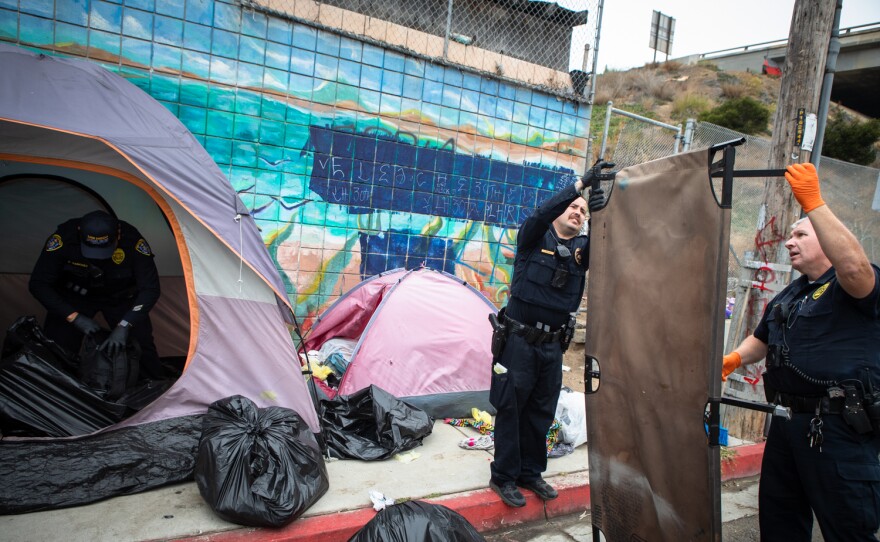For months, San Diego Mayor Todd Gloria has touted efforts to clear sidewalks of homeless encampments that he says pose a hazard to public health and safety.
Sanitation crews have swept through encampments and thrown away hundreds of tons of trash and property, potentially violating court orders in the process. Police have increasingly used illegal lodging and encroachment — a city law that was intended to prohibit trash cans from blocking a sidewalk — to ticket and arrest people who refuse to go to a shelter. It led to a dramatic spike in arrests.
“We’re a civil society,” Gloria said during a press conference in June. “We’ve agreed to a certain set of rules to live by. There have to be consequences when individuals choose to ignore those laws.”
But an inewsource analysis of offenses that generally target unhoused people found that the San Diego city attorney’s office rejects two out every three cases that are referred by police.
Of the cases the office has pursued, every single one has ended in dismissal — often because the city attorney asked for it.
The lack of prosecutions and convictions points to a disconnect between the San Diego Police Department — under the direction of Gloria — and the city attorney’s office, said Joshua Chanin, a San Diego State University associate professor who teaches public administration and criminal justice.
“In an ideal world, the police and the city attorney’s office have the same priorities,” he said.
Studies have shown this policing-led, shelter-first approach is ineffective at helping people out of homelessness. Given the resources it takes to cite and arrest people only to have cases rejected or dismissed, Chanin told inewsource, “My questions would begin with, ‘What’s the point?’”
None of the agencies involved — the mayor’s office, city attorney, public defenders or police department — were willing or able to answer that question.
The city attorney's staff declined several interview requests. They would only communicate over email, and did not answer basic questions about the data inewsource requested or about why none of the cases forwarded to their office resulted in a conviction.
Spokesperson Richard Jackoway wrote that the pandemic shut down court operations for several months in 2020, which meant cases were not heard in a timely manner, and changes to maximum sentencing and court diversion early last year affected how courts handle these cases.
The outcomes have dramatically changed. Prior to the pandemic, the city attorney’s office managed to land a guilty plea 83% of the time in cases that generally target unhoused people. Every single case since August 2020 has been dismissed, the data shows.
Officials in the public defender’s office also declined an interview, opting instead to send a written statement that they encourage “these types of homeless-related crimes to be resolved through Homeless Court or other services available in the community instead of prosecution.”
Homeless Court is similar to a diversion program where participants agree to have misdemeanor offenses like jaywalking or being under the influence of a controlled substance resolved in ways that emphasize positive lifestyle choices over traditional judicial procedure.
Mayor Gloria, who emphatically stated during his State of the City address earlier this year that homelessness was the city’s No. 1 priority, did not respond to interview requests and did not answer questions inewsource sent to his office. His spokesperson Rachel Laing told inewsource in an email that the lack of prosecutions isn’t his problem.
Residents expect the city to enforce its laws, Laing wrote, pointing to more than 1,300 resident complaints about homeless encampments. She shared five emails with inewsource that were sent in the past couple months from people telling Gloria to “do the right thing for the taxpaying residents” and that “kindness (for homeless people) isn’t working!”
“We are not going to be a city that’s content with people living on our streets and sidewalks,” Laing wrote.
“We would prefer to be offering every person on the street a key to an apartment, but decades of underbuilding housing means we don’t have sufficient housing for that model at this time,” Laing wrote, adding that shelters have far more to offer in the meantime.
Laing ignored emailed questions about the resources used to arrest and prosecute people for these crimes, and about the lack of prosecutions following arrests.
“It’s a complete misappropriation of resources,” said Xuan Santos, an associate professor of sociology and criminology at California State University San Marcos, adding that the efforts to urge people into shelters are for show.
“To me, it’s symbolic window dressing,” Santos said.
A new monthly count of unhoused people living downtown shows the problem is getting worse. The Downtown San Diego Partnership reported a record high last month of more than 1,600 people experiencing homelessness, with nearly half living in the East Village.

‘A serious form of punishment’
San Diego police are required to follow a “progressive enforcement model” before officers can arrest people for crimes related to their homelessness. Officers first issue warnings to those who block a sidewalk or sleep where they shouldn’t. Then police offer two options: either go to a shelter or receive a ticket. After two tickets and a third refusal, they wind up in jail.
The entire process can happen in a matter of days, and following an arrest, many people are back on the streets within hours. But the legal proceedings that follow an arrest can take months or even years.
The city attorney’s office has been more likely to reject these cases since the start of the pandemic. Jackoway, the spokesperson, declined to explain the shift, saying only that prosecutors reject cases for a number of reasons, such as lack of evidence.
Many of the cases are “now several years old, involve defendants with no new additional offenses, rely on evidence that is no longer available or all of the above,” he wrote.
“Our Office reviews about 20,000 cases a year. We do not intend to comment on any specific case, but rather will let our work and our court filings speak for us.”
Jackoway also declined to explain why every recent case pursued by the city attorney’s office has been dismissed. The court filings don’t shed much light on this either.
inewsource analyzed a sample of eight court cases out of the 103 that have been dismissed since August 2020, which is when cases started being heard after the pandemic shut down operations. In all but one, city attorneys either agreed with public defenders and judges that a case should be dismissed, or asked for the dismissal themselves.
Coleen Cusack, a defense attorney who donates her services to homeless people charged in these cases, said the reason why the city isn’t prosecuting these cases is clear.
“These laws are unconstitutional laws, and so they would be hard pressed to be able to defend them in court,” Cusack said. “Homeless people aren’t committing crimes. They’re just surviving in public view and so the law seeks to punish these acts of survival whenever they are visible to others.”
Even if it seems like nothing happens in court, this is all really bad, said Chris Herring, an associate professor of sociology at University of California Los Angeles. He published a study last year about homelessness in San Francisco that argues police use shelter beds as a tool to cite, arrest and confiscate the property of unhoused people under the guise of health and safety.
“The arrests themselves are a serious form of punishment, especially when they’re linked with people losing property or the places that they find safe,” he said.
But it’s odd that San Diego prosecutors initially decide to move forward with any of these cases, Herring said. San Francisco prosecutors rejected similar cases, he said, with very few exceptions.
“What is it about those cases?” Herring asked, that makes San Diego prosecutors pursue them.
The city attorney’s office declined to answer that question, too.

Sleeping and sitting
Just before sunrise on a cool morning last spring, San Diego police encountered a 47-year-old man sleeping outside of the Neil Good Day Center, a facility that provides homeless services. Records show officers gave him a notice to appear in court on two misdemeanor offenses — overnight camping and ignoring posted signs. inewsource isn’t naming him because he could not be reached for comment.
The city decided to pursue the case. But over the course of 10 months, the man failed to appear in court twice, and a warrant was issued for his arrest. His court-appointed lawyer never made contact with him, and in February, asked the judge to dismiss the case. Without objection from the city’s prosecutor, the judge agreed.
Data from the city attorney’s office shows the result was “Dismissed other (see note)” — an ambiguous phrase used to describe nearly two out of every three dismissals since the start of the pandemic. The city attorney’s spokesperson wrote that such cases could be dismissed for a number of reasons, including unavailability of witnesses.
“Our notes are privileged Attorney Work Product and are not disclosed,” he wrote.
In another case, police encountered a 51-year-old man on a downtown sidewalk two weeks before Christmas last year. Ultimately charged with blocking a sidewalk, the hearing was set for March. He, too, failed to appear in court and his public defender asked the judge to dismiss the case. This time, the city objected, but the judge dismissed anyway “in furtherance of justice” — another ambiguous phrase used to dismiss roughly one out of every four cases. It can apply to a number of situations, including insufficient evidence.
In one out of every 10 dismissals, the defendant pleaded guilty in another case, usually a more serious charge, records show.

Courthouse barriers
A number of other cases are still working their way through the court system, waiting to be heard, often because people just don’t show up.
Failure to appear in court is a recurring problem for people experiencing homelessness — it happened in five out of eight court cases reviewed by inewsource. When someone doesn’t show up for court, a judge can issue a bench warrant. In these cases, they often do, which allows police to make an arrest upon contact and can lead to a cascade of legal trouble and fines.
“There’s lots of barriers to people showing up in court,” said homeless advocate Michael McConnell.
People experiencing homelessness often don’t have anywhere to store their belongings. More and more people refuse to take care of urgent matters, such as doctors’ visits or court hearings, “because they don’t want to come back and have all their belongings gone,” McConnell said.
“All it does is further traumatize people,” McConnell added. “It’s not helping anybody get into housing.”
-
A new homeless shelter in the Midway District is now accepting residents. In other news, a place that has served members of the LGBTQ-plus community recovering from addiction is closing its doors.
-
One of the bills awaiting Governor Gavin Newsom’s signature would allow farmworkers to vote on unionizing by mail or card check. He’s vetoed similar legislation before.









